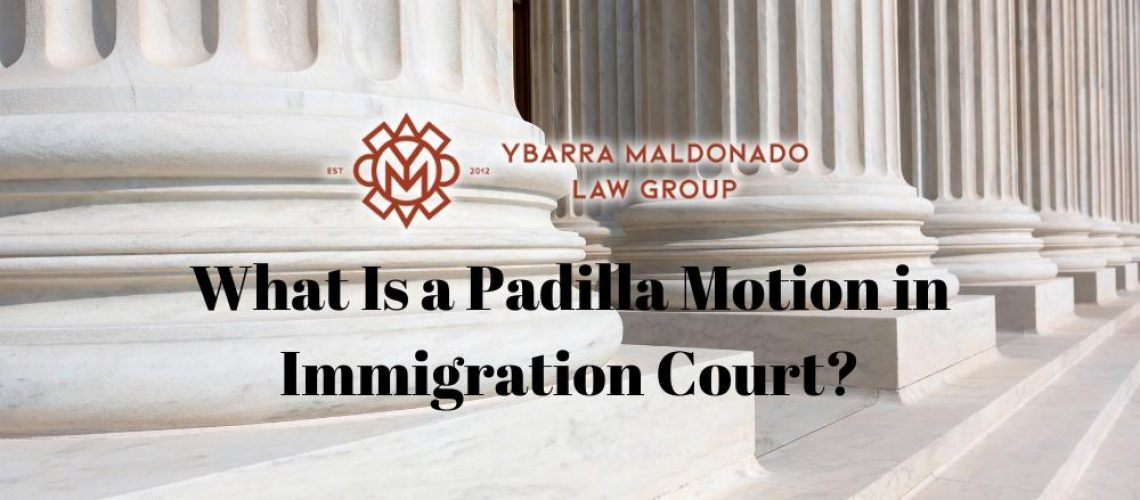Padilla motions are pivotal in addressing the immigration consequences of criminal convictions for non-citizens. Understanding the significance of these motions, the obligations of defense attorneys, and the avenues available for challenging inadequate advice is crucial for individuals navigating these complex immigration law matters.
If you or a loved one are confronting immigration issues stemming from a criminal conviction, seeking guidance from an experienced Phoenix criminal immigration attorney is essential to safeguarding your rights and immigration status. Take proactive steps to protect your future by consulting with a knowledgeable legal professional who can provide the necessary support and representation in these challenging situations. Call Ybarra Maldonado Law Group at 602-910-4040 today to schedule a case evaluation with us.
What Immigration Consequences Can Arise from Criminal Convictions?
If a criminal defense attorney fails to advise a non-citizen in their criminal case properly, a plea deal or criminal conviction could result in immigration consequences. If the defendant was not advised that their plea deal could have potential immigration consequences, they may qualify for a Padilla motion.
Two potential consequences of a guilty plea in criminal immigration court are deportation and inadmissibility.
Deportation
A criminal conviction, even for a seemingly minor offense, can result in deportation for non-citizens. Immigration laws categorize certain crimes as “aggravated felonies” or “crimes involving moral turpitude,” making individuals deportable. The severity of the offense and whether it is classified as a misdemeanor or felony can significantly impact the immigration consequences.
Inadmissibility
Beyond deportation, certain convictions can render individuals inadmissible, meaning they are barred from entering or re-entering the United States. Factors such as the nature of the crime, sentence length, and immigration status can affect admissibility determinations. For example, if an individual pleads guilty to a crime involving moral turpitude on the advice of their defense attorney, they may face inadmissibility.
What Is Padilla v. Kentucky?

In the 2010 case of Padilla v. Kentucky, the United States Supreme Court held that criminal defense attorneys must inform their non-citizen clients about the immigration consequences of a guilty plea. Failing to provide this information could constitute ineffective assistance of counsel, violating the defendant’s Sixth Amendment rights.
The case originated in 2001 when José Padilla was working as a truck driver. That year, he was arrested for illegally transporting marijuana. During his case, his defense lawyer told him that he should not worry about his immigration status being affected by a conviction. Following his counsel’s advice, Padilla entered a guilty plea as part of a plea bargain.
Padilla appealed his case in the Kentucky Appellate Court, arguing that he was given ineffective assistance of counsel, which means his 6th Amendment rights were violated. He won his appeal, but the Commonwealth of Kentucky requested that the Kentucky Supreme Court hear the case as a “discretionary review.”
The Kentucky Supreme Court ultimately decided that regardless of whether Padilla’s attorney properly advised him made no difference. The court held that “affirmative misadvice” concerning deportation did not constitute grounds for post-conviction relief.
However, the United States Supreme Court agreed to hear the case and ultimately reversed the KY Supreme Court’s decision. The US Supreme Court held that defense attorneys must inform their immigrant clients of the risk of deportation under the following three circumstances.
- First, if the law is clear, the attorney must tell the client that deportation will result from a conviction.
- Second, if the law is unclear, they must tell the client that deportation may result from a conviction.
- Third, defense counsel must inform criminal defendants of deportation consequences and cannot be silent about them.
What Is a Padilla Motion?
Padilla motions are legal tools used in immigration court to address the collateral consequences of criminal convictions on a non-citizen’s immigration status. These motions are named after the landmark case of Padilla v. Kentucky, which brought attention to the obligations of criminal defense attorneys regarding advising their non-citizen clients about the potential immigration consequences of a plea deal.
A Padilla motion is a legal action brought by a non-citizen against their defense attorney, alleging that the attorney failed to provide accurate advice regarding the immigration consequences of a plea deal. These motions seek to vacate or set aside a guilty plea based on ineffective assistance of counsel. Essentially, if a non-citizen plead guilty on the advice of their criminal defense attorney and faced immigration consequences as a result, a Padilla motion may help their case.
How Can I Bring a Padilla Motion?

Bringing a Padilla motion typically involves specific legal procedures under federal immigration law. The most common legal procedures for these motions are as follows.
Direct Appeals
In some cases, individuals may challenge their convictions through direct appeals in the criminal justice system. This process involves citing ineffective assistance of counsel due to the failure to advise on immigration consequences.
Motion to Withdraw Plea
Individuals who pleaded guilty based on inadequate advice regarding immigration consequences can file a motion to withdraw their plea. This motion asserts that if they had known about the potential immigration fallout, they might have made a different decision regarding their plea.
Petition for Habeas Corpus
In certain circumstances, individuals can file a petition for habeas corpus, claiming their detention or conviction violates their constitutional rights. This avenue can be utilized to address ineffective assistance of counsel regarding immigration consequences.
What Is Needed for a Successful Padilla Motion?
To succeed in a Padilla motion, several elements must be established:
- Ineffective Assistance of Counsel: Demonstrating that the defense attorney failed to provide accurate advice on immigration consequences for pleading guilty.
- Prejudice: Showing that the individual suffered harm due to the attorney’s lack of constitutionally competent counsel, such as facing deportation or inadmissibility that could have been avoided with proper guidance.
- Time: The defendant’s conviction occurred after the Padilla v. Kentucky decision (March 2010).
The first two elements are the most important elements to prove. They are the cornerstone of any successful Padilla motion.
What Is Post-Conviction Relief in Immigration Cases?

Post-conviction relief refers to legal remedies sought after a criminal conviction. In the context of immigration cases, it involves challenging the validity of a conviction based on ineffective assistance of counsel for a criminal defendant, among other grounds. Obtaining post-conviction relief can be instrumental in safeguarding an individual’s immigration status.
Contact a Phoenix Criminal Immigration Attorney
Navigating the complexities of Padilla motions and their implications in immigration court requires expert legal guidance. A skilled Phoenix criminal immigration attorney can provide invaluable assistance in evaluating your case, exploring legal options, and advocating for your rights in both criminal and immigration proceedings.
At Ybarra Maldonado Law Group, we understand the challenges immigrants face when dealing with criminal charges and their potential impact on immigration status. Our dedicated team of attorneys is committed to providing comprehensive legal representation, ensuring that your rights are protected every step of the way. To schedule a case evaluation about your case, please call our office at 602-910-4040 today.


